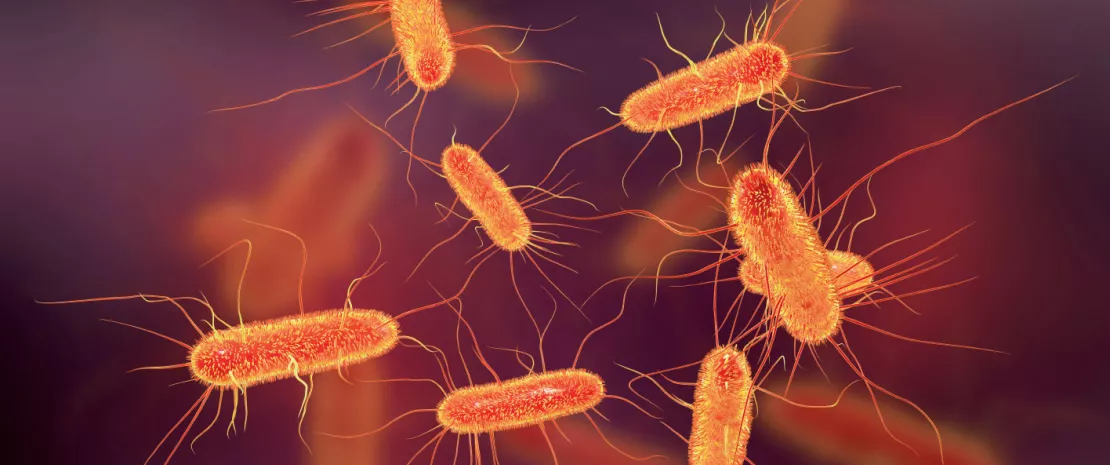A bacterial dysbiosis characteristic of IBD
Inflammatory bowel diseases (IBD) are characterized by an inflammation of the gastrointestinal wall that may affect either the entire intestinal tract (Crohn’s disease, CD) or be confined to the rectum and colon (ulcerative colitis, UC). They are associated to an impairment of the biodiversity and composition of bacterial, fungal and viral microbiotas, which are believed to play a role in the disease pathogenesis and/or progression.
Lay public section
Find here your dedicated section
Sources
This article is based on scientific information
Sections

Escherichia coli
About this article
A double bacterial gut dysbiosis, characterized by a decrease in some beneficial strains and an increase in pathogenic strains, is associated to IBD. These composition abnormalities could be both the cause and the consequence of these disorders, thus inducing a vicious circle.
In patients with IBD, structural and functional alterations of the gut microbiota have been observed. The composition is also different in patient undergoing an acute episode compared to those in remission.2
Decrease in beneficial bacteria and increase in pathogens
First feature: decreased Firmicutes/ Bacteroidetes ratio. A decrease in somebeneficial bacteria from the Firmicutes phylum is observed, for instance, lower abundance of Faecalibacterium prausnitzii, a commensal bacterium with anti-inflammatory properties and whose decrease seems to be a marker of CD;3 reduced rate of Firmicutes, commonly observed in patients with IBD;4 significant decrease in Bacteroides fragilis (Bacteroidetes), a bacterium with proven protective effects in murine models of induced colitis.5 In patients undergoing an acute phase of IBD, there is also a lower abundance of Clostridium coccoides, Clostridium leptum, Faecalibacterium prausnitzii and Bifidobacterium.2 Second feature: excess of potentially harmful microorganisms, especially Gammaproteobacteria and Actinobacteria. In one out of three patients with CD, the mucosa is invaded by a strain of Escherichia coli called AIEC (Adherent-invasive Escherichia coli).3 Contrary to other infectious agents, these strains are able to cross the intestinal mucus barrier, adhere to it, then invade the gut epithelial cells, and survive and replicate in macrophages. This leads to the secretion of large quantities of TNFα, which in turn causes inflammation.
Dysbiosis: cause or consequence of ibd?
This bacterial gut dysbiosis, which seems to be a marker of IBD, is suspected to play a role in its pathogenesis. A study conducted in mice genetically predisposed to UC revealed a two-way relation between this disease and gut dysbiosis.6 Bacterial dysbiosis could thus not only contribute to the onset of IBD, but also be a secondary consequence of gut inflammation. Different hypotheses were suggested to explain this dual phenomenon: some species from the Firmicutes phylum have anti-inflammatory properties and are major producers of short-chain fatty acids (SCFA)–especially butyrate–, which represent the main energy-producing substrate for colonocytes. Moreover, a decrease in the number of Firmicutes could trigger or intensify a local inflammation by decreasing the levels of anti-inflammatory cytokines (key regulators of mucosal immunity) and/ or by altering the colon barrier function through a deficit of SCFA.4






